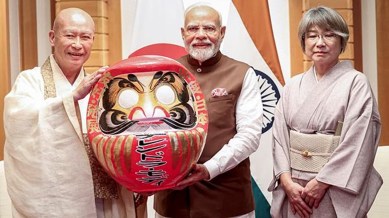📣 For more lifestyle news, click here to join our WhatsApp Channel and also follow us on Instagram
Prime Minister Narendra Modi receives sacred Daruma doll on trip to Japan; how this cultural artifact forms a bridge between Indian heritage and Japanese tradition
The Daruma doll stands as one of Japan's most recognisable cultural artifacts

In a moment that beautifully encapsulates the deep cultural ties between India and Japan, Prime Minister Narendra Modi was presented with a traditional Daruma doll during his visit to the Shorinzan Daruma-Ji Temple in Kitakatsuragi, Japan, on Friday, August 29, 2025. The sacred gift was bestowed by Rev. Seishi Hirose, the chief priest of the temple, adding profound spiritual significance to the diplomatic gesture.
It represents a confluence of shared spiritual heritage that traces back over 1,500 years, connecting the birthplace of Buddhism in India to its flourishing traditions in Japan. For India, this moment represents recognition of its role as the birthplace of Buddhism and its continuing influence on global spirituality.
What is the Daruma doll?
The doll represents the popular Japanese proverb ‘Nana korobi ya oki,’ which translates to ‘fall seven times, get up eight,’ representing the power of resilience.
The Indian connection
The story of the Daruma doll begins not in Japan, but rather in ancient India, with a remarkable monk named Bodhidharma. According to Tierra Zen, “Bodhidharma was an Indian or Persian monk known for his fundamental role in the spread of Zen Buddhism.”
Bodhidharma’s journey from India to China, and eventually his spiritual influence reaching Japan, represents one of history’s most significant cultural transmissions. “Being the founder of Zen, Bodhidharma, or Daruma, is a very popular figure in Japan and a recurring theme in art. His physical features, so exotic for an Oriental, and the anecdotes of his legend make his representations easily recognisable,” notes Tierra Zen.
Legend has it that Bodhidharma spent nine years in meditation facing a wall at the Shaolin Temple in China, demonstrating such unwavering determination that his legs atrophied from lack of use. This extraordinary display of persistence and spiritual dedication became the inspiration for the Daruma doll’s armless, legless form.
The doll’s round, weighted bottom allows it to return to an upright position when knocked over, physically embodying the principle of resilience and recovery from setbacks.
Cultural significance in modern Japan
Today, Daruma dolls have transcended their religious origins to become integral parts of Japanese popular culture. They appear in various colours, each carrying specific meanings: red for good fortune and prosperity, white for love and harmony, gold for wealth and success, and green for health and fitness.
Politicians, business leaders, students, and ordinary citizens alike turn to Daruma dolls during important occasions. The dolls have become universal symbols of determination and optimism in Japanese society.
📣 For more lifestyle news, click here to join our WhatsApp Channel and also follow us on Instagram